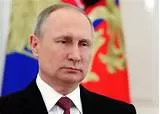
CONCERN OVER PUTIN’S HEALTH, HAS NOT BEEN SEEN FOR TWO WEEKS
President Vladimir Putin has not been seen in public for 13 days following claims of ill health, while the Kremlin is accused of releasing pre-recorded meetings.
The Russian president appears to have mysteriously disappeared – with his last public appearance being nearly two weeks ago at a conference in Sochi.
According to the Telegram channel VChK-OGPU, Putin has been undergoing health treatments: “Indeed, Putin has been absent from work recently and receives all reports exclusively via special communications.”
Those close to him are given the same standard answer in such cases: “He is undergoing a medical examination and a regular course of general health improvement.”
The channel added that nobody actually knows what the real answer is or where he is.
This is not the first time speculation have grown regarding the Russian president’s health.
Some claim he has appeared overly tired, having difficulty walking and strongly gripping tables in meetings – sparking rumours of Parkinson’s disease.
He was also said to have cancer several times in 2014, 2020 and 2022, and reportedly travels with an entourage of doctors to assist him in case of a medical emergency.
There are also reports of Putin using body doubles, who are said to have gone through intense plastic surgery to look identical to the president.
Speaking to The Sun, Russia expert Keir Giles said: “If you watch Putin closely, it’s hard to avoid the suspicion that often some of the appearances you’re seeing are not, in fact, the same person.”
He also noted the stark differences in the Russian president’s appearance – from looking healthy at one event to looking sick at the next.
“There are some times when he looks really quite frail, bloated, puffy, shaking, having to grip onto the table and only giving very short five-minute speeches even on major public events,” Giles said.
And then there are times when he appears to bounce back as a much healthier individual who is standing up and speaking for 40 minutes.”He added that the state of Putin’s health was a “mystery to us all.” The government has previously denied that Putin’s health is failing.
In October, Putin admitted in a televised meeting that he regularly undergoes medical examinations at the Central Clinical Hospital in Moscow.
After this comment, his aides quickly dispelled any rumours that the president was ill. His spokesman Dmitry Peskov said: “He meant routine medical examinations.”
The state news agency TASS also insists Putin “has no health problems.”
Regardless of the rumours, the Russian president seems to have no intention of slowing down, having won an election that permits him to continue ruling until 2030.
He has continued to lead Russia and its war on Ukraine.

